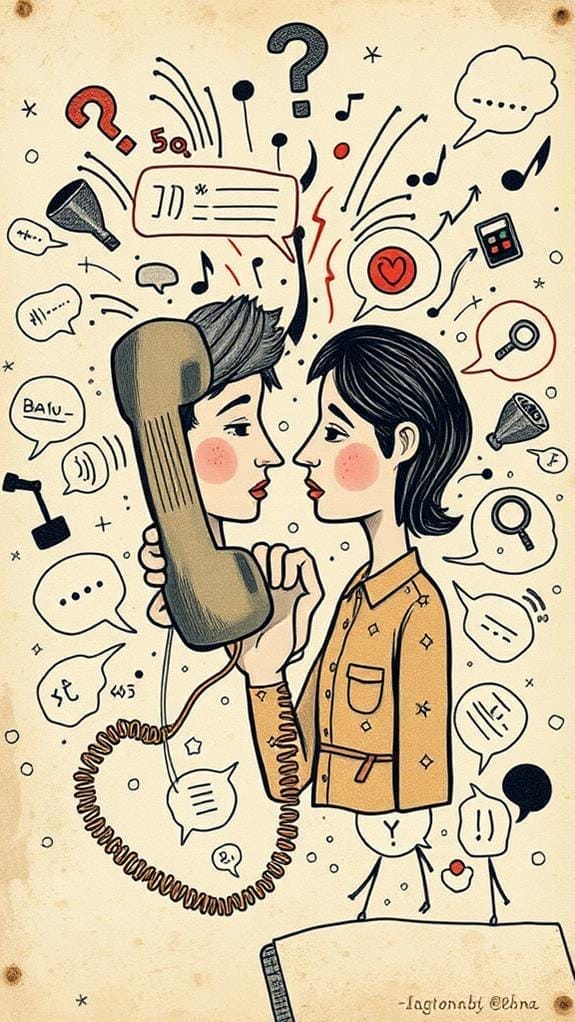Interpersonal relationships face several common barriers. Miscommunication is a major player, often leading to tension and confusion. Differing expectations can create frustration, while emotional baggage might cloud perceptions and reactions. Trust issues also arise, stemming from a lack of vulnerability and previous experiences. A lack of empathy distances partners, making it hard to connect emotionally. Cultural differences can add another layer of complexity, as communication styles vary. Recognizing and addressing these barriers can strengthen your relationships and turn potential conflicts into opportunities for growth. Stick around, and you'll uncover strategies to bridge those gaps effectively!
Key Takeaway
- Miscommunication and misunderstandings create tension; active listening and clarification techniques improve communication significantly.
- Differing expectations about relationship goals can lead to frustration; open discussions help align perspectives and promote understanding.
- Emotional baggage from past experiences can trigger disproportionate reactions; acknowledging and addressing these triggers fosters healthier relationships.
- Trust issues, often stemming from emotional baggage, require consistent actions, vulnerability, and open dialogue to build a solid foundation.
- Lack of empathy leads to emotional distance; practicing active listening and engaging in meaningful conversations nurtures emotional connections.
Miscommunication and Misunderstandings

When people communicate, misunderstandings often stem from miscommunication, which can lead to tension in relationships. You might find that your communication style clashes with someone else's, creating a maze of confusion. Understanding different communication styles can help you navigate this maze more effectively.
Active listening plays a significant role in minimizing miscommunication. It involves truly paying attention—not just to the words, but also to the verbal cues and body language the other person is using. By being fully present and engaged, you're able to pick up on emotional nuances, facilitating a feedback loop that enhances clarity. If you're unsure about something, don't hesitate to employ clarification techniques. Asking open-ended questions not only shows you're invested but can also uncover hidden meanings or assumptions.
Emotional intelligence helps you better grasp your own feelings and those of others, allowing for smoother interactions. When conflict arises, it's important to address it swiftly. Recognizing miscommunication patterns early on can lead to effective conflict resolution. You can avoid escalating tensions by gently bringing light to misunderstandings before they spiral out of control.
Differing Expectations

Many people encounter challenges in relationships due to differing expectations. You might want a deep emotional connection, while your partner focuses on practical goals. These discrepancies can lead to frustration and dissatisfaction, impacting your relationship's overall health. Understanding each other's relationship goals is essential to bridge these gaps.
To illustrate, consider the following table that highlights common expectations in relationships:
| Your Expectation | Partner's Expectation |
|---|---|
| Daily communication | Weekly catch-ups |
| Sharing responsibilities | Equal division of tasks |
| Long-term commitment | Taking it day by day |
This table showcases how compatibility concerns can arise when both parties have different timelines and views on what a relationship should look like. If you envision spending weekends together but your partner prefers solo time or with friends, you'll likely feel disconnected.
To enhance your relationship, start by openly discussing your expectations. This way, you can negotiate and align your goals. Instead of avoiding these conversations, embrace them. Humor can help lighten the mood and make discussions feel safe, creating an environment where both of you can express yourselves honestly.
Emotional Baggage

Emotional baggage can weigh you down in relationships, often resurfacing at the most unexpected moments. It's like carrying an invisible backpack filled with the remnants of past experiences, disappointments, and wounds. Each relationship history adds weight, influencing how you perceive new connections. You might not realize it, but old emotional triggers can spring to life, making you react in ways that seem out of proportion to your current situation.
Imagine you're in a new relationship, and something your partner does reminds you of a painful breakup. Suddenly, you're not just annoyed; you're feeling a surge of anxiety and distrust. It's essential to recognize these patterns, as they can create unnecessary barriers. When you let emotional baggage dictate your responses, you risk pushing loved ones away, even if they have no connection to your past hurts.
Identifying your emotional triggers is a healthy step toward healing. Take time to reflect on your feelings and consider where they stem from. It's not about blaming your past; it's about understanding how it shapes your present. Communicating openly with your partner about any baggage can pave the way for greater intimacy. This openness invites safety into your relationship, transforming an emotionally tense scenario into a supportive dialogue.
Ultimately, addressing your emotional baggage can free you to embrace new relationships fully. You deserve to experience love without the shadows of the past looming large. So, let's begin unpacking that invisible backpack and lighten your emotional load!
Trust Issues

Carrying emotional baggage can lead to developing trust issues in relationships, making it hard to believe in the sincerity of a partner's intentions. When past disappointments linger, it can feel like you're constantly walking on eggshells, doubting if your partner truly has your best interests at heart. Trust building isn't an overnight process; it takes time and conscious effort.
To foster a trusting environment, consider these pivotal aspects:
| Component | Description |
|---|---|
| Vulnerability Acceptance | Embrace the idea that being vulnerable doesn't mean you're weak. It's a big step toward showing your partner you're willing to share your true feelings. |
| Open Communication | Establish a space where both of you can openly discuss fears and insecurities without fear of judgment. This creates a deeper sense of safety in the relationship. |
| Consistency | Make sure your actions match your words. Consistency reinforces your commitment, gradually reassuring your partner that you're in it together. |
Lack of Empathy

A lack of empathy in relationships can create significant emotional distance between partners. When you or your partner struggles to understand each other's feelings, it becomes easy to feel isolated. Without empathy, you're missing out on the emotional connection that makes relationships fulfilling.
Emotional intelligence plays a key role here. By being aware of and understanding your own feelings, you can better relate to your partner's. When both of you develop this emotional intelligence, it encourages a deeper bond and fosters communication. Active listening is another powerful tool. It's not just about hearing words; it's about understanding the emotions behind those words. When you truly listen, you validate your partner's feelings, making them feel cared for and valued.
Imagine sitting down with your partner after a long day. Instead of just venting, you both take time to share your experiences. By engaging in active listening, you validate each other's emotions and strengthen your emotional connection.
However, even the best couples can miss the mark on empathy, especially during heated moments. It's important to pause, take a breath, and really try to see things from your partner's perspective. This simple shift can turn conflict into productive dialogue, creating a safe space for both of you to express yourselves.
Cultural Differences

Cultural differences can create a complex tapestry in interpersonal relationships, influencing how partners communicate and connect. You might find that cultural norms shape everything from your daily interactions to your broader understanding of each other's value systems. For instance, what's considered polite or respectful can vary widely between cultures.
This diversity impacts your communication styles, too. Some people may express emotions openly, while others might prefer to keep their feelings private. These differences can lead to misunderstandings if you're not aware of each other's social practices. When it comes to conflict resolution, your approaches may differ—some cultures emphasize direct dialogue, while others favor a more indirect method. Recognizing these differences can be a game changer in relationship dynamics.
It's essential to adopt a mindset of curiosity and open communication. Ask questions and share your own cultural contexts; this fosters safety and empathy, helping you both navigate challenges together. Finding common ground can lead to understanding and appreciation for each other's perspectives.
Remember to embrace humor as you explore these cultural differences—who doesn't love a funny story about miscommunications? Just make sure your jokes are culturally sensitive! Ultimately, addressing cultural differences with care can enhance the depth and richness of your relationship, transforming potential barriers into bridges of understanding. So, take the plunge into these differences; they might just become your relationship's hidden strengths!
Frequently Asked Questions
How Can I Improve Communication Skills in Relationships?
To improve communication skills, practice active listening and pay attention to nonverbal cues. Develop empathy, resolve conflicts assertively, exchange feedback openly, and validate emotions to foster trust and strengthen your relationships.
What Are Signs of Emotional Baggage in a Partner?
You might notice signs of emotional baggage in your partner through relationship anxiety, defensive behavior, or emotional reactivity. Past trauma and unresolved conflict can create fears of intimacy and influence their attachment styles and relationship patterns.
How Does Trust Affect Long-Term Relationships?
Trust is like a garden; it thrives on care. Engaging in trust-building activities can help you overcome trust issues. When nurtured, trust enhances your connection, making your long-term relationship bloom with safety and understanding.
What Role Does Humor Play in Overcoming Barriers?
Humor plays an essential role in overcoming barriers. It fosters laughter, bonding people through shared joy. Humor benefits relationships by easing tension, creating a safe space for connection, and encouraging open communication. So embrace laughter together!
How Can Professional Help Benefit Interpersonal Relationships?
Imagine a garden thriving with care; professional help nourishes your interpersonal relationships. Through therapy techniques and relationship counseling, you'll enhance communication, build emotional intelligence, and develop support systems for effective conflict resolution in a safe environment.
Conclusion
So, you've navigated the treacherous waters of interpersonal relationships, only to find that the biggest hurdles are often self-made! Miscommunication and differences in expectations aren't just minor bumps; they're like pit stops on a road trip that no one asked for! Remember, building trust and practicing empathy can turn those barriers into bridges. Embrace the quirks and challenges—they're the unexpected spice in your connection recipe! After all, who knew relationships could be so complicated yet delightfully rewarding?








